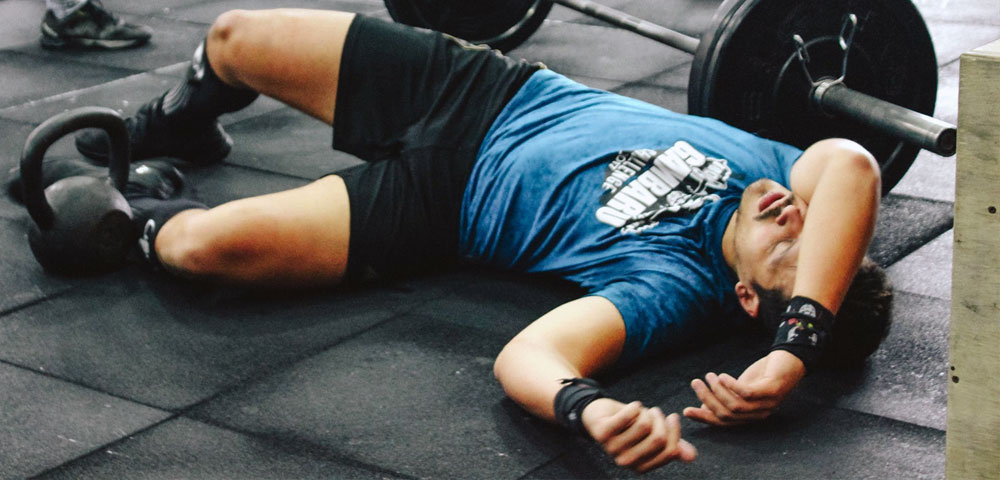Regular sleep and exercise are critical to leading a healthy and active lifestyle. Hitting the gym regularly without enough sleep and recovery could put your body at risk. The impact of sleep on exercise (and vice-versa) is important to understand so that we can find the right balance between the two.
On this page
A good night’s sleep can ensure greater alertness and a positive impact on your mood throughout the day. Studies have shown that inadequate (or excess) sleep can affect cognitive and motor performance. It can also contribute to obesity. Exercise, on the other hand, is a great preventive measure against fatal heart diseases, obesity and age-related cognitive decline. Research shows that a lack of physical exercise can lead to chronic diseases. It is crucial to balance levels of sleep and exercise while observing the impact of one on the other.
How Sleep Impacts Your Workout
Sleep is often considered to be complementary to exercise. It helps repair exerted muscles, increasing muscle memory and protein build up. Also, there is an increase in performance and decrease in injury. Just as the right nutrition can aid your workout, adequate sleep can boost your exercise performance.
Working-out on No Sleep
While quality sleep results in a better workout, lack of sleep has adverse effects on your health. The risks include:
- Limited Strength Training: The growth hormone released during sleep is particularly useful during strength training. It repairs and strengthens bones and muscles. A lack of sleep may limit the weight you could lift during a workout. Your muscles depend on the growth hormone for better performance.
- Risk of Injury: It has been observed that minimal sleep increases the risk of injury during exercise. In this study, teenage athletes with less than 8 hours of sleep were 1.7 times more likely to have an injury when compared to those who slept for 8 hours or more.
- Risk of Accidents: It can also increase the risk of accidents. This is because sleep reduces cognitive and motor abilities.
- Greater Perceived Exertion: The perception of pain and tolerance increases due to a lack of sleep. A study observed that sleep-deprived athletes were more likely to perceive greater exertion (despite no change in heart rate and metabolic rate) when compared to participants with regular sleep. The psychological effect of sleep deprivation will trick you into feeling tired sooner.
Taking a Nap After Your Workout
While a good night’s sleep is essential for a better workout, taking a nap after a workout is debatable. Physical exercise tends to raise energy levels during and immediately after. Once this burst of energy has passed the body tends to feel drowsy and needs refueling. Taking a short nap might be the natural tendency. A post-workout nap has pros and cons.
It can be beneficial to your body as sleep can help repair and grow strained muscle tissue. It also promotes weight loss as repairing muscle tissue will burn fat more effectively. A nap can also be counterproductive. As the body becomes still after intense activity, you may experience muscle cramps. This is especially the case if you skip stretching and hydration.
If you feel sluggish post-workout it is advisable to nap for a an hour. A longer nap might hinder your calorie burn and decrease your metabolism rate. It is also recommended to hydrate yourself to avoid cramping. If you feel your muscles tingling during the nap, drink plenty of water and shake your muscles out.
How Exercise Impacts Your Sleep
Many studies have found that exercise can aid those with sleeping disorders. The increase in sleep quality due to a workout has resulted in the suggestion of exercise as a non-pharmacological cure for insomnia. A study found that a physically active lifestyle improved the overall sleep quality. While working out right before sleeping appears to be a concern.
Working-Out before Bed
As our days get busier, we resort to working out whenever we can. Most of us pick the end of the day as it is the only time to get some exercise. This may not be the best time to workout. It is widely believed that working out right before bedtime is not conducive to sleep. It may cause post-workout insomnia or result in lighter stages of sleep. However, recent studies have also shown that working out before bed resulted in no drastic change in sleep quality.
Sleepy after Workout
Working out at night can be a convenient and preferred option for most of us. Further, it has been observed to be beneficial to sleep quality (if you do not train like an athlete or suffer from insomnia).
The main concern with a high-intensity workout before bed is the rising of cortisol levels, adrenaline and body temperature. Together, these can prevent and hinder sleep right after a workout. In an hour or two, the body begins to return to a relaxed state. This can be a good time to call it a day.
Exercise uses up energy stored in the muscles. This burn of energy is primarily responsible for the tired or ‘sleepy’ state experienced after the acute energy spike after a workout. Working out relieves you of daily stress by relaxing clenched and knotted muscles. Reducing the physical symptoms of stress can allow you to fall asleep quicker.
Conversely, if you workout during the day it might be inconvenient to find yourself dozing off after a workout. Feeling sleepy or tired after a workout can disrupt your day’s plans and productivity. Here are a few tips to fight sleepiness after a workout:

- Stay Hydrated: Drink ample water before, during and after a workout. Dehydration can often trigger tiredness and make you feel sleepy.
- Fuel before and After: Fuel your workout with carbohydrates and replenish lost energy with a meal of carbohydrates and protein.
- Sleep Well: Ensure you get a good 8 hours of sleep every night. This will keep you alert and active throughout the day.
- Take a Rest Day: If you have been pushing your body too hard, it may be advisable to listen when it is tired. Take a day of recovery and catch up on rest and sleep.
- Take a Nap: If you absolutely need to sleep, a one hour nap after your workout can help energize your body and mind.
Workouts to Do Before Bed
- Body-weight Exercises: This includes easy sets of exercises like squats, jump squats, lunges, crunches, push-ups etc…
- Aerobic Exercises: You can also do a short run, jump rope, jumping jacks or running up and down the stairs. These must be done one or two hours before bed as they can raise the body temperature significantly.
- Yoga: The most conducive exercise for sleep, calming yoga postures can help relax and rewind your muscle after aerobic or resistance training.
Post-Workout Insomnia
While there is a natural tendency for the body to wind down in 3 or 4 hours after a workout, some people report a case of insomnia after a bedtime workout. This can happen due to the following reasons:
Rise in Cortisol, Norepinephrine and Adrenaline
A rise in hormonal levels is the primary reason people experience difficulty in sleeping, after a workout. Cortisol is a stress hormone that is released in response to the body exerting itself. This hormone steadily decreases throughout the day and dips during bedtime so that the body is prepared for sleep. However, a workout at this time can cause the cortisol levels to spike up.
Aside from this, adrenaline and norepinephrine will also rise. These hormones are responsible for raising your heart rate, metabolic rate, blood flow to muscles, muscle strength etc. This increases your performance but can hinder the body’s ability to relax.
Ideally, these hormones will naturally fall back to the usual levels in time. However, particularly intense workout sessions can result in sustained levels of norepinephrine. The amount of exertion is thus important in cases of post-workout insomnia. In such cases, it is advised to stick to yoga or light exercises during night time.
Stimulants and Dehydration
Another major reason for sleeplessness is caffeine. Some people use caffeine as a stimulant to power particularly strenuous workout. If a large amount of caffeine is consumed after evening, it may keep you up. It can also dehydrate you.
Additionally, exercise elevates core body temperature. Adequate hydration, especially after a workout, can bring down the body temperature. Long workouts of endurance or strength can raise body temperature significantly. This involves further dehydration.
Tips to Wind Down Post-Workout
If you have difficulty sleeping after a workout, consider the following tips:
Stretches and Yoga

Try doing some cool down stretches. While it is important to stretch before and after a workout, some cool down stretches or calming yoga will soothe your body for sleep. There are particularly postures that can help you relax. Remember to not exert yourself with inversions (upside-down postures like cartwheels).
The Three-Hour Rule
If possible, schedule your workout to finish three or four hours before you need to sleep. This gives your body ample time to wind down and return to a state of rest. Exercising in the late afternoon can ensure you catch your body’s cortisol and body temperature decline. This naturally prepares your body for sleep. You can also consider moving your workout to an earlier time. The best time to workout has been estimated to be between 2 PM and 5 PM. However, it may not be practical to workout at this time. In such cases, it is recommended to workout whenever it is convenient as it will ensure that the habit is sustained.
Post-Workout Fuel
A light snack after your workout will ensure you get quality sleep. Too much food can cause you to feel bloated, while little food can make you hungry and interrupt your sleep. Opt for a snack that has equal amounts of carbohydrates and protein. You can also drink some chamomile tea to relax the body. Hydration during and post-workout will blunt the cortisol response and ensure you sleep easily.
Meditation
Do some meditation/deep breathing exercises. This can help bring down your cortisol levels (stress hormone). Mindfulness meditation requires you to pay attention to your breathing and focus on the present. This causes a relaxation response which opposes the stress hormone.
Take a Shower
Take a cold shower. This will bring down your body temperature and prepare your body for sleep. Additionally, it will help muscle recovery by decreasing inflammation. It can also trigger sleep signals which will give you deeper sleep.
Conclusion
Sleep and exercise share a bidirectional relationship with each other. Those who lead an active lifestyle have observed better sleep quality, while those who workout cannot ignore the positive effects of sleep and recovery on their overall performance.
Together, sleep and exercise are a combination that promises a healthy mind and body. It is important to be mindful of the timing and intensity of sleep and exercise. This is to ensure that one is not counterproductive for the other. Usually, your body is perceptive to changes and can signal any red flags. Listening to our bodies is the best advice when it comes to sleep and exercise.

